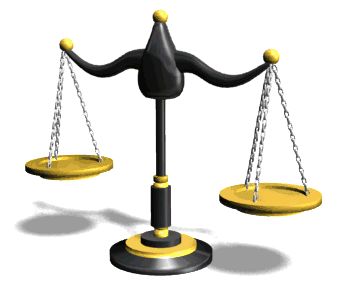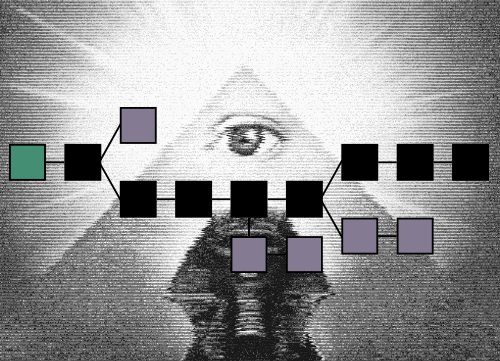The Blame Game will eventually leave Decentralized Applications in Control
We’re beginning to see the natural effects of too much centralization of power. But notice that the bankers have already learned this lesson, so they sit in the background while the overly eager seek control and the spotlight. Too much visibility is not good for business. There are those of us who depend upon visibility to engage in voluntary business, while there are those who use their capital to coerce business either through taxes or regulation. The blame game will chase away many sources of centralization in the coming years.
Mark Zuckerberg is beginning to learn the hard way what happens when you sit in control and have to face another with more power. But many people are drawing the wrong lesson from what happened here. While it’s certainly true that compromising privacy is something to be discouraged, everyone using FB should have known that is the result of data held in any central database. There’s no such thing as “private” on a central server. There’s only public, strict public and global. This is because the scope of central servers has to be inverted since hackers can break into any centralized database at will.

source
So while there’s a difference between willingly sharing information and hacking, the practical reality is you should have known that everything you put on a central server will eventually become public. Only you can be responsible for how you share your information, but many of you submitted not knowing any better once you became a number in the social security system at birth. The centralization of information will eventually be distributed back to the source because of this, but it will take time for authority to learn about the lesson of too much control.
A steady stream of resignations from the Trump administration is further evidence of the results of the blame game. The finger pointing is going into overdrive and will continue for the next several years until the only place you can point a finger to is yourself. Ideally this would only leave the blockchain in control. Unfortunately, web 3.0 technologies are not ready yet, so we are likely to have a hybrid system that doesn’t fully replace lawyers and politicians for a generation or so. The year 2020 will be the epicenter of the blame game coming home to roost and I expect many prominent control freaks to fall from grace in the decade following this.
Blockchain 3.0 will become the new “Legal Commons”

source
Eventually political positions will become so toxic that the only thing replacing them will be the mathematics of nature. This will cause the system to become opt-in rather than opt-out. Opt-in systems place all responsibility on the individual. It increases the power of individuals while decreasing the power of authority. In the past we needed authority to solve issues of contention. Now they are becoming the main source of contention itself.
The issue of contention has been solved by blockchain technology that uses various rules of consensus without a central authority. Finger pointing will not work against a system with nobody in control. Instead because the individual is in control and because the history of the blockchain makes recording history immutable, the rulings of courts will become as obsolete as using a pen and paper to do math.
The Law will eventually become Decentralized

source
By using an opt-in starting point, one has to assume all responsibility for one’s self. This is not currently the case in governmental systems where you are the property of the state. Your social security number labels you as property and authority dictates the boundaries of your behavior. In a system of decentralized law, you are the one who agrees to the terms and conditions by participating and the results are dictated by the mathematical precision of the blockchain. There will be no one sitting in judgement of you, and the blockchain as a witness can deliver absolute precision about what happened and when in all contractual business.
The devices that you use will be the only source of identity because all centralized databases will be understood to be hacker vulnerable. This will send all PII (Personally Identifiable Information) back to the source which is you and your devices. The proof that it is you is simple to achieve by accessing the public hash of anything that you own with your private keys which only you control. Because nobody else will be able to access your public hash, that is the surest confirmation of your identity possible.
Banks will begin to feel the results of Decentralization next

source
Banks are still quite vulnerable to the blame game going on because they’ve been turned into deputies in the system of the law enforcement of money with such rules as KYC (Know Your Customer) and AML (Anti Money Laundering). But instead of their positions becoming too toxic to replace, few will value the position because regulation prevents them from playing in the cryptocurrency space which is largely impervious to attack by other authority.
As these new blockchains take over, banks will be prevented from participation in them because they are too slow to adapt to the regulatory framework that they have to adhere to. This will cause their centralized frameworks to fall behind. I expect them to attempt a centrally controlled cryptocurrency as a national or world level replacement which would create a digital panopticon, but eventually because of the vulnerability of central databases, it will expose them to the blame game once again.
Eventually everyone will know why authority wants to keep control of this information and it’s for all of the wrong reasons. Authority has been made obsolete. It’s only a matter of time before the public fully understands why there’s a better replacement.
Donations (public bitcoin address):

3FwxQsa7gmQ7c1GXJyvDTqmT6CM3mMEgcv

Thx for another informative post. Easy to read.
Please continue up with creating interesting content - it may be hard at the beginning to build reach and solid followers base.
Steemits needs solid content builders so just dont ever give up! :)
Already followed and upvoted :) Cheers,
Thanks for the encouragement. But I don't quite fall in the same category as most content creators here. Not worried about "making it" on Steemit because I'm more or less retired and collect a private pension already. I still operate my own software business and haven't been working a corporate job since Oct 2006.
I'm recording my thoughts to the blockchain more or less so that I can say "I told you so" to the naysayers in the future when they wonder why they didn't see it coming. I will be able to point back to Feb 2017 as to when I did. The irony is that my website gets about 1500 - 2000 unique visitors / day according to google analytics, but it's on a subject matter that isn't nearly as important as the subject of technical disintermediation of authority.
There are lots of people on here trying to make it for the first time, slaving away at a job they hate, but doing this in their spare time. For them it's life or death. For me, I'm entering my golden years just hoping they don't turn to coal because flag money goes belly up. That's why I'm invested in several crypto's. They're my social security insurance (I go to collect around 2023, just as they go under). That's when various cryptos will have replaced flag money, so I'll just swap my social security check for my crypto wallet if that happens.
I read your post one more time. I quite agree with most of your opinions. But not all of them.
"The proof that it is you is simple to achieve by accessing the public hash of anything that you own with your private keys which only you control. Because nobody else will be able to access your public hash, that is the surest confirmation of your identity possible."
I dont see it happening ever. The fact that we're trying to decentralize everything now as a solution to many problems will sooner or later fire back heavily. Lack of centralized control = lack of customer support. And I cannot imagine that many of us would like idea of having their own datas stored "somewhere out there", all those data being transparent and not being able to recover access to accounts once it's hacked.
Blockchain is also very transparent. To transparent to many people. I dont think the way it function today will encourage general population to us it a a scale that you're talking abut. Adoption will always be a problem.
Blockchain is currently way more vonurable than for hacking attacks that we think. It's just hackers will go after hacking into our laptops to steal our access private keys etc. And they will succeed very often.
I love blockchain but I will never ever close my account in Bank. I will always hope that there will be goverment that can be blamed and can be changed. And I want my personal data to be stored in centralized place, which will be not transparent at all. And I believe most regular people would share my stand.
Im glad to see that you've so many visitors a day on your site. Incredible.
Im also investing in crypto with similar goal :)
ps. what is "flag money"?
Some of this response suggests to me that you haven't familiarized yourself enough with the idea of blockchain tech and the difference between centralized and decentralized structures. It's always better to distribute risk rather than to have it all in one place. Otherwise you have hacks like the one that happened last fall with Equifax compromising the data of 145 million Americans. Banks are leaking information horribly. I've been a victim of credit card fraud multiple times. Sometimes they won't reverse transactions and you're left with taking on the burden of someone else's fraud or mistakes.
There's a talk by Andreas Antonopoulos called "Bubble Boy vs Sewer Rat" that explains why centralized tech such as banks that are creating "bubble boy IT" are extremely vulnerable. As for the issue of backfire, that is much more likely to happen on centralized systems. Decentralized blockchains have been attacked non stop since 2009 and nobody has ever cracked the encryption directly.
While blockchains are public now, they don't have to be public. All that information can be encrypted and left as hashes referencing data in a different location without giving anything away. Bitcoin didn't do this yet.
As for the consumer protection aspect of bitcoin, you need to understand that soft promises can never be hardened to give certainty, but hard promises can be softened to deliver consumer protections. This video explains why...
PS - flag money = national fiat currency
"Some of this response suggests to me that you haven't familiarized yourself enough with the idea of blockchain tech and the difference between centralized and decentralized structures"
You can say that. Im still learning and every day I feel like I discovered something new. I also believe we just simply do not understand each other.
I really appreciate that you put so much time and effort to explain your point of view.
Very informative and mature reply. BIG THX
And I watched lately "Bubble Boy vs Sewer Rat". I found it also very valuable.
The current system tells you to leave your problems to be solved by the state that then fails over and over again. But as you say, decentralised systems mean that you own the consequences of your actions.
The game of blaming others is over. No control, no blame. I realised this a few night ago when I could not sleep because my wife and son were keeping me awake. I was not angry at my son, I know that he is too young and I have no control anyways. Its life, just deal with it. But I was getting more and more annoyed at my wife :)
our problems will always be "solved" by some sort of authorities.
Couldn't help think about hybrid cars from this quote. I've never thought about the potential need for a hybrid system before. Interesting theory.
More great insight. The funny thing is that corporations and banks are much quicker to adapt than governments. And governments evolve faster than religion. Blockchain tech will leave everything in the dust, powered by self-sustaining propellant in the form of cryptocurrency.
Thank you for another intriguing read! The system opt-in is certainly a promising concept, yet it will require sufficient plurality of decentralised offers to choose what you are opting in for. If there is only one (or very few) major chains, your only option is to submit to its ruling or being marginalised by not being able to participate at all. Anyhow i feel there will be a better choice for the majority of the population, that today is still bound by physical location.
wow. look who's here :)
find me wherever intriguing discussions are going on...
btw commented on one of your questions on similar topic would be happy to spin thoughts further...
I noticed that you joined my little contest. Thx. you're indeed very responsive